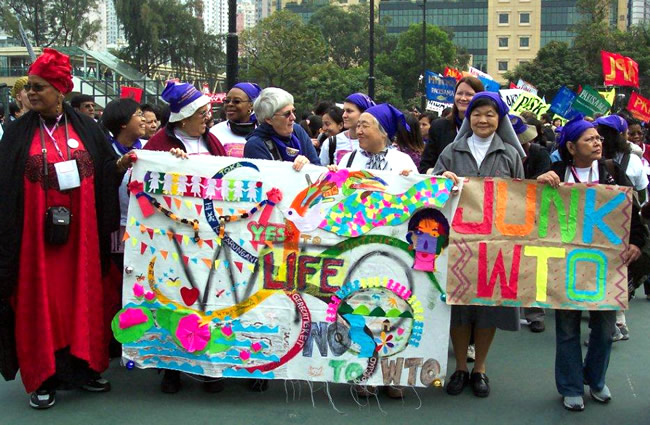Women Working for Justice

WTO protest hong Kong
Last month, we marked the 100th anniversary of International Women’s Day (IWD). Yet women’s historic struggle for better working conditions, better wages and improved benefits is far from over. In fact, it is at a critical stage in this era of globalization where the corporate agenda rules and many women are seen as disposable labour rather than persons with inherent rights.
Governments, particularly in some nations of the global South, see women as a form of revenue generation and a cushion to any economic downturn. In the Philippines, Indonesia and some other Asian and Latin American countries, more and more women are leaving their homes and families to seek employment overseas as contract workers, guest workers, or temporary foreign workers. The jobs are precarious and often dangerous. We see a lot of these women in parks and malls pushing strollers and providing care to children who are not their own. In remote and rural areas they work on farms or in meat packaging factories; in the cities, they serve us coffee and clean our hotel rooms. Their hard-earned dollars keep their families just above the poverty line and their countries’ economies afloat. These women easily share their shy but friendly smiles hoping for a smile back and a hint of acknowledgment that you understand their oppression and the pain of being uprooted and separated from their children and families.
In late March, as part of its commemoration of IWD’s 100th anniversary, the Independent Women Workers Association (an organization of women working as live-in caregivers and homecare providers) held a tribute to Juana Tejada, a caregiver who died of colorectal cancer on March 8th, 2009. Juana was remembered not only as a member of the group, but also for the legacy she left behind: the Juana Tejada Law, which lifted the medical inadmissibility clause in the Immigration and Refugee Protection Act (IRPA) in relation to caregivers’ application for permanent residency.
According to this clause, in order to qualify for permanent residency caregivers must have completed a 24-month live-in requirement. Juana had done this but was twice denied permanent residency because of her medical condition. In her struggle, she unmasked how women in the live-in caregivers’ program are treated as disposable commodity – returned to the country of origin when found defective.
We must never forget women like Juana, who refused to give up. And we must continue to stand alongside those who continue the struggle here in Canada and around the world.
The women of Colombia who are on the front lines fighting for peace and human rights, and demanding an end to violence so that their children will grow up in secure environment and have a better future.
The women in the Philippines who, despite continued political killings and militarization, are resolute in raising their voices in hope of justice, freedom and democracy.
The women in the Democratic Republic of Congo as they continue to assert their dignity and rights in the face of violence and deprivation in their everyday lives.
The women in Sudan who came out and actively participated in the recent referendum asserting their right to suffrage and demanding peace.
The women in Grassy Narrows, an indigenous community on the borders of Ontario and Manitoba, who are resisting clear cut logging in their territory and the continued destruction of Mother Earth.
Women around the world who have picked up the torch and vowed to continue the fight for bread and dignity that our courageous sisters started 100 years ago.
Connie Sorio is the Asia Partnerships Coordinator at KAIROS.








